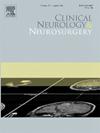Impact of preoperative nutritional status on morbidity and mortality in geriatric patients undergoing spine surgery: Role of geriatric nutritional risk index
IF 1.8
4区 医学
Q3 CLINICAL NEUROLOGY
引用次数: 0
Abstract
Background
Malnutrition is a risk factor for poor surgical outcomes amongst the elderly. However, the association between malnutrition and outcomes in geriatric patients undergoing spine surgery has been understudied. The aim of this study was to assess associations between malnutrition and 30-day morbidity and mortality in geriatric patients undergoing spine surgery.
Methods
A retrospective cohort study was performed using the American College of Surgeons National Surgical Quality Improvement Program database. All geriatric patients (≥ 65 years old) were categorized by Geriatric Nutritional Risk Index (GNRI) score: Normal, Malnourished, and Severely Malnourished. Patient demographics, comorbidities, and adverse events (AEs) were assessed. Multivariable logistic regression analyses identified independent predictors of 30-day postoperative AEs, extended length of stay (LOS), non-routine discharge (NRD), unplanned readmission, and mortality.
Results
Of the 79,160 patients identified, 58,906 (74.4 %) had Normal nutritional status, 12,184 (15.4 %) were Malnourished, and 8070 (10.2 %) were Severely Malnourished. The Malnourished and Severely Malnourished cohorts had significantly increased proportion of AEs (p < 0.001) and a longer LOS (p < 0.001). The Malnourished and Severely Malnourished cohorts had significantly increased proportions of NRD (p < 0.001), unplanned readmissions (p < 0.001), and 30-day mortality (p < 0.001). On multivariable analysis, Malnourished and Severely Malnourished statuses, respectively, were independently associated with any AE (p < 0.001), extended LOS (p < 0.001), 30-day unplanned readmission (p < 0.001), NRD (p < 0.001), and 30-day mortality (p < 0.001).
Conclusion
Our study suggests that preoperative GNRI-defined malnutrition may increase the risk of adverse postoperative outcomes following spine surgery in geriatric patients.
术前营养状况对脊柱手术老年患者发病率和死亡率的影响:老年营养风险指数的作用
背景:营养不良是老年人手术预后不良的一个危险因素。然而,在接受脊柱手术的老年患者中,营养不良与预后之间的关系尚未得到充分的研究。本研究的目的是评估接受脊柱手术的老年患者营养不良与30天发病率和死亡率之间的关系。方法采用美国外科医师学会国家手术质量改进计划数据库进行回顾性队列研究。所有老年患者(≥65岁)按老年营养风险指数(GNRI)评分进行分类:正常、营养不良和严重营养不良。评估患者人口统计学、合并症和不良事件(ae)。多变量logistic回归分析确定了术后30天ae、延长住院时间(LOS)、非常规出院(NRD)、计划外再入院和死亡率的独立预测因子。结果79160例患者中,营养状况正常的58,906例(74.4 %),营养不良的12,184例(15.4 %),严重营养不良的8070例(10. %)。营养不良和严重营养不良组的ae比例显著增加(p <; 0.001),LOS较长(p <; 0.001)。营养不良组和严重营养不良组NRD (p <; 0.001)、计划外再入院(p <; 0.001)和30天死亡率(p <; 0.001)的比例显著增加。在多变量分析中,营养不良和严重营养不良的状态,分别是独立与任何AE (p & lt; 0.001),扩展洛(p & lt; 0.001),30天意外重新接纳(p & lt; 0.001)”(p & lt; 0.001)和30天死亡率(p & lt; 0.001)。结论:我们的研究表明,术前gnri定义的营养不良可能会增加老年患者脊柱手术后不良预后的风险。
本文章由计算机程序翻译,如有差异,请以英文原文为准。
求助全文
约1分钟内获得全文
求助全文
来源期刊

Clinical Neurology and Neurosurgery
医学-临床神经学
CiteScore
3.70
自引率
5.30%
发文量
358
审稿时长
46 days
期刊介绍:
Clinical Neurology and Neurosurgery is devoted to publishing papers and reports on the clinical aspects of neurology and neurosurgery. It is an international forum for papers of high scientific standard that are of interest to Neurologists and Neurosurgeons world-wide.
 求助内容:
求助内容: 应助结果提醒方式:
应助结果提醒方式:


